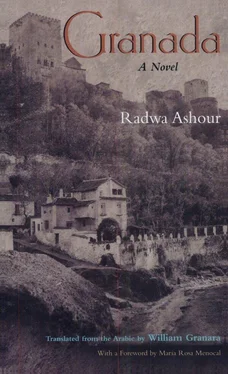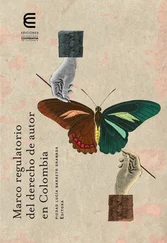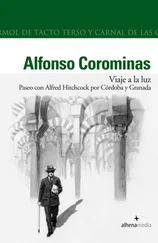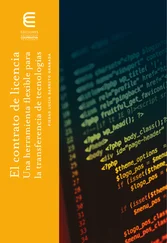Radwa Ashour - Granada
Здесь есть возможность читать онлайн «Radwa Ashour - Granada» весь текст электронной книги совершенно бесплатно (целиком полную версию без сокращений). В некоторых случаях можно слушать аудио, скачать через торрент в формате fb2 и присутствует краткое содержание. Год выпуска: 2003, ISBN: 2003, Издательство: Syracuse University Press, Жанр: Современная проза, Историческая проза, на английском языке. Описание произведения, (предисловие) а так же отзывы посетителей доступны на портале библиотеки ЛибКат.
- Название:Granada
- Автор:
- Издательство:Syracuse University Press
- Жанр:
- Год:2003
- ISBN:9780815607656
- Рейтинг книги:5 / 5. Голосов: 1
-
Избранное:Добавить в избранное
- Отзывы:
-
Ваша оценка:
- 100
- 1
- 2
- 3
- 4
- 5
Granada: краткое содержание, описание и аннотация
Предлагаем к чтению аннотацию, описание, краткое содержание или предисловие (зависит от того, что написал сам автор книги «Granada»). Если вы не нашли необходимую информацию о книге — напишите в комментариях, мы постараемся отыскать её.
Granada — читать онлайн бесплатно полную книгу (весь текст) целиком
Ниже представлен текст книги, разбитый по страницам. Система сохранения места последней прочитанной страницы, позволяет с удобством читать онлайн бесплатно книгу «Granada», без необходимости каждый раз заново искать на чём Вы остановились. Поставьте закладку, и сможете в любой момент перейти на страницу, на которой закончили чтение.
Интервал:
Закладка:
But no matter: as with all genuine literature the ambiguities seep out everywhere, and a part of the bittersweetness of this novel certainly lies in the softly spoken understanding the reader has of how many of these Muslims, and how much of their culture, will indeed survive the crucible of this ghastly moment but transformed into something quite different from what they were in Granada before 1492. What makes the novel gripping and enjoyable is that as it progresses the characters are transformed by life in general — yes, of course by the crises provoked, by the earth-shaking events of the time, but no less — and sometimes far more — by the births of children and the deaths of fathers and mothers. And by the search for love. In 1991, Salmon Rushdie published his own small but jewel-like contribution to this body of imaginative literature, determined to make us realize how close we all really are to 1492. In that story Rushdie sums up peaks through the mouth of Columbus to sum up these complex and often heart-breaking ties between our hearts and history, the history that often seems to set a stage for us we have not chosen and yet from which we cannot escape: “‘The search for money and patronage,’” Columbus says in Rushdie’s novel, “‘is not so different from the quest for love.’” And later: “‘The loss of money and patronage,’” Columbus says, “‘is as bitter as unrequited love.’” [3] “Christopher Columbus and Queen Isabella of Spain Consummate Their Relationship, Santa Fe, January 1492,” was first published in the New Yorker of June 17, 1991. It was Rushdie’s first published work of fiction after the fatwa forced him into exile.
Translators Acknowledgments
Iwish to thank Radwa Ashour for her encouragement and support for my translation of Granada, as well as for her many suggestions and explications. Also, a profusion of gratitude to Ayman El-Desouky and Sinan Antoon, who graciously read the text over and over and made important contributions to the polished version. In addition, I wish to thank Shawkat Toorawa, Ariel Blumenthal, Jonathan Smolin, and Laila Parsons for their input, and Michael Beard and Marilyn Booth for their expertise and support. To Maria Rosa Menocal a special thanks for her magnificent foreword, and finally to Mary Selden Evans of Syracuse University Press a symphony of praises for her wisdom, understanding, counsel, and good humor.
W.G.Granada
1
At the crack of dawn one day Abu Jaafar saw a naked woman walking down the hill and in his direction, as though she were coming deliberately to meet him. The closer she got to him the more convinced he became that she was neither impudent nor inebriated. She was a young woman of extraordinary beauty, slender and graceful, with breasts like small, smooth, perfectly shaped ivory vases. Her jet black hair cascaded over her shoulders, and a sadness made her wide eyes seem even wider on her intensely gaunt, pallid face.
The streets were still empty, the shops had not opened, and the light of day had not yet dissolved the violet haze of the early dawn. Abu Jaafar first thought that what he was seeing was a mere figment of his imagination. He then peered more closely, and he came to grips with his own utter amazement. He went toward the woman, took off his woolen cloak, and wrapped it around her body. He asked her her name and where she lived, but it seemed as though she could neither see nor hear him. He left her to continue on her way, and he watched her from behind as she walked on slowly, his eyes fixed on the jingling gold spangles that wrapped around her ankles caked with the mud of a road her two feet had been treading.
In spite of the wintry chill and the howling winds that shook the walnut trees lining both sides of the road, Abu Jaafar remained standing by the door of his shop until the sun released its pale yellow rays and exposed the street’s prominent features.
Inside the shop he exchanged a few words with Naeem and then went to a corner where he sat quietly. The boy couldn’t help but notice his patron’s silence, and he responded by suppressing his usual noisiness, as he began the day’s work with a desire to do a good job to please his patron and with a genuine concern for him, making Naeem sneak a peek at him every now and then.
“What’s your name, my boy?”
The man was very tall and somewhat frightening, looking no different from all those older men who intimidated him, who would no sooner stop him on the street than he would leap away like a scared jackrabbit. He lifted his gaze and glanced up over his towering body until he came to the eyes, blue and peaceful. He didn’t rush, and he answered in a soft voice: “Naeem.”
“Where is your family, Naeem?”
“They went away, or they died. I don’t know.”
Abu Jaafar stretched out his enormous hand and took hold of the boy’s hand, and the boy followed with the longest strides his two young feet allowed him to take in order to keep pace.
Abu Jaafar fed him, gave him shelter, and began to teach him all the tricks of his trade. He trained him in tanning and drying goat hides for binding. He taught him how to arrange the pages of a manuscript and bind them together. He allowed him to undertake every task save a couple he preferred to do himself. He instructed Naeem to follow him closely so that he could learn: to thread the twine into the awl, and slowly and carefully pass the awl and thread through the spine of the book, once, twice, a third and fourth time, back and forth until the stitching was tight; then he let him attach the spine to the cover and place the book under a press. Several days later, he would remove the book from underneath the press and Abu Jaafar would write the title and the name of the author, as well as the owner of the manuscript, in gold ink or something else that may have been requested. Finally, he would engrave the cover with intricate patterns.
Читать дальшеИнтервал:
Закладка:
Похожие книги на «Granada»
Представляем Вашему вниманию похожие книги на «Granada» списком для выбора. Мы отобрали схожую по названию и смыслу литературу в надежде предоставить читателям больше вариантов отыскать новые, интересные, ещё непрочитанные произведения.
Обсуждение, отзывы о книге «Granada» и просто собственные мнения читателей. Оставьте ваши комментарии, напишите, что Вы думаете о произведении, его смысле или главных героях. Укажите что конкретно понравилось, а что нет, и почему Вы так считаете.












